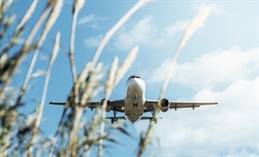
An investment of about US$175 billion per year is needed to reach net-zero emissions by 2050, according to a recent industry report outlining how the aviation sector could achieve its sustainability goals.
In its report, "Making Net-Zero Aviation possible: An industry-backed, 1.5°C aligned Transition Strategy", the Mission Possible Partnership (MPP) and the Clean Skies for Tomorrow Coalition (CST) said average annual investments between 2022 and 2050 to get global aviation to net zero are estimated at about US$175 billion — roughly the GDP of a city like Berlin or Amsterdam.
MPP and CST — which said their report is backed by more than 50 industry leaders — noted that 95% of these capital investments would be required for fuel production and upstream assets like renewable electricity generation.
The report lays out strategies for the global aviation sector to achieve net-zero emissions by 2050 while complying with a 1.5°C carbon budget.
Ramping up SAF production needed
Among others, it said that bringing aviation on a path to net-zero emissions by 2050 requires a doubling of historical fuel efficiency gains of aircraft, a rapid roll-out of Sustainable Aviation Fuels (SAFs), and the market entry of novel propulsion aircraft (i.e., hydrogen, battery-electric, or hybrid aircraft) in the mid-2030s.
MPP and CST said currently, about 0.05–0.10 Mt SAF are produced per year, only a tiny fraction of the global aviation fuel demand of about 320 Mt jet fuel, and current project pipelines for SAF production of about 8 Mt are "insufficient and need to be scaled up" by a factor of 5–6 to supply 40–50 Mt SAF by 2030.
That SAF volume could require about 300 SAF plants, it added.
"Until 2050, 300–370 Mt SAF could be required to fulfill the jet fuel demand of a net-zero aviation sector. Hence, current SAF production levels need to increase by a factor of 3,000–7,000 within less than three decades," the report said.
"Although average fuel costs are increasing in the net-zero scenario, the cost of flying could remain stable, if the higher costs of SAFs compared with fossil jet fuel are counterbalanced by increased efficiency gains," it added.
The report also noted that hydrogen and battery-electric aircraft can make aviation more efficient starting in the 2030s and could potentially supply up to a third of the final energy demand by 2050.
US$175B annual investment for aviation decarbonization
"Average annual investments between 2022 and 2050 to get global aviation to net zero are estimated at about US$175 billion. 95% of these capital investments would be required for fuel production and upstream assets like renewable electricity generation," MPP and CST added.
The roadmap also highlights the implications the transition has on the energy system. By 2050, the aviation sector could demand 5%–10% of the expected global renewable electricity demand, 10%–30% of the expected global hydrogen demand, up to 25% of the global sustainable biomass, and 600–850 Mt CO2 captured from the atmosphere.
Global aviation is currently responsible for about 3% of total global, anthropogenic CO2 emissions – has seen an increase of over a third between 2010 and 2019 alone.
The report said if aviation were unmitigated, it could be responsible for 22% of global emissions by 2050.
MPP and CST added that while the current path will see global temperatures rise 2.4°C, this net-zero roadmap would get the industry back on track to deliver on a 1.5°C target.
Immediate action needed in this decade
"The report makes clear that immediate action within this decade is required to set global aviation on a path to climate-neutrality, following three major milestones: carbon-neutral growth until 2030, halving emissions until 2040, and net-zero emissions by 2050," the report added.
MPP and CST said the report was endorsed by major global aviation leaders including Airbus, American Airlines, Air France-KLM, and easyJet.
MPP led by the ETC, RMI, WMBC, and the World Economic Forum, is an alliance of climate leaders focused on supercharging the decarbonization of seven global industries representing 30% of emissions – aviation, shipping, trucking, steel, aluminum, cement/concrete, and chemicals.
MPP said without immediate action, these sectors alone are projected to exceed the world's remaining 1.5°C carbon budget by 2030.



